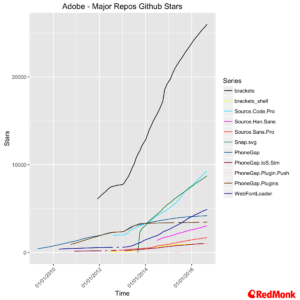 Adobe Max is one of Adobes largest events, and we had the opportunity to join them in San Diego last week. Originally a developer conference, these days the focus is far more on designers. That said, there is still a substantial amount of developer content interspersed throughout the conference.
Adobe Max is one of Adobes largest events, and we had the opportunity to join them in San Diego last week. Originally a developer conference, these days the focus is far more on designers. That said, there is still a substantial amount of developer content interspersed throughout the conference.
As an experience the non-technology keynotes at Max are pretty mind-blowing. Understanding the wider world is something we do not do enough at technology conferences, and the day two keynotes at Max included some incredibly thought provoking keynotes from photographer Lynsey Addario and sculptor Janet Echelman.
We are all aware of the horrors going on in the wider world, but in many ways we choose, perhaps not to ignore, but at the very least to remove ourselves from having to think deeply about issues beyond our, and let us be honest here, very comfortable lives.
It is easy to do so, one can take note of something in a newspaper article or a news item on television for a few fleeting moments, minutes perhaps and then easily move on. A keynote, such as the one given by Lynsey Addario, which gives one no choice but to listen, and forces one to think in a far deeper way about the broader world around you can only be a very powerful thing. Adobe deserve a lot of kudos for using their keynotes in this way.
If you want to take anything away from my notes on the conference, don’t take anything about the technology. Take away two things, firstly, there are currently 65 million people on the planet displaced by conflict and famine, secondly incredibly brave journalists and photographers like Lynsey Addario are documenting these events alongside a multitude of people, from NGO’s to military personal, who are working to make a difference. In an era where politicians are playing populist football with people’s lives, keep this in mind.
Machine Learning, AI & Sensei
To say we are at peak machine learning and AI washing would be an understatement. Too often the actual use cases and requirements are completely lost in a wave of hyperbole wrapped around unrealistic hyperbole.
This is what makes the Sensei announcement stand out. The use cases are discrete, they are directly applicable to Adobes product line and will be gradually opened up developers interested in using these capabilities. I won’t go through the announcement in detail, you should read it yourself , but suffice to say this is a very calculated and deliberate approach to play in areas where Adobes strengths lies.
As we have noted in the past, most developers are not going to access machine learning through frameworks and custom models, rather they will be using API calls into another system. Adobe are playing exactly into this longer term trend.
So Why Were RedMonk at Max? Adobe & Developers
To say Adobe have had a mixed history in terms of their interactions with developers would be very polite. Despite their involvement in a number of opensource projects the overall perception across many developer communities is negative. These perceptions are in no small way due to how Adobe has flip-flopped on their involvement with various communities and integrated some of their acquisitions.
Under their new CTO & EVP, Abhay Parasnis, there is definitely a renewed focus on their overall developer story, and a focus on engaging in a much better manner with developers. We had the opportunity to sit down with a number of members of Abhays team over the course of Max and discuss their plans. While most of these conversations are under NDA, suffice to say there is a lot of positive momentum internally. Everyone we spoke with is aware of how a big a task is ahead of them, and in many instances having a reasonable level of awareness of what lies ahead is a huge part of the transition.
You only need to look at Adobes involvement in projects such as the current proposal to bring OpenWhisk, a serverless framework that is being actively developed byIBM, into the Apache Software Foundation to realise that change is afoot.
Credits: The Janet Echelman sculpture photograph is by Stew Dean, taken at Oxford Circus, London and shared under a CC 2.0 License. The original can be found on Flickr.
Disclosures: Adobe and IBM are a current RedMonk clients.

No Comments